

Drew Hayden Taylor explores ‘native humour’ – The Argosy. First Nations author and playwright speaks at Mt.
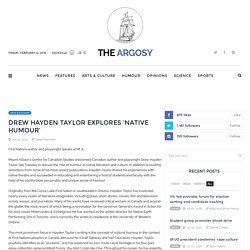
A. Mount Allison’s Centre for Canadian Studies welcomed Canadian author and playwright Drew Hayden Taylor last Tuesday to discuss the role of humour in native literature and culture. The Comedy Couch - Russell Peters Interview. The Michigan Daily. Engineering sophomore Calvin Cheung is convinced there is just no way people cannot believe the ethnic stereotypes they watch on TV.
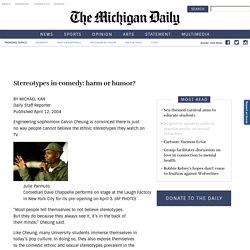
“Most people tell themselves to not believe stereotypes. But they do because they always see it, it’s in the back of their minds,” Cheung said. Like Cheung, many University students immerse themselves in today’s pop culture. In doing so, they also expose themselves to the comedic ethnic and sexual stereotypes prevalent in the entertainment industry. Recently, several minority student groups on campus have voiced concerns, protesting the offensive stereotypes. Does Racist Humor Promote Racism? Drew Hayden Taylor’s latest play is no laughing matter. After Ojibway writer Drew Hayden Taylor accepted an invitation to emcee an event celebrating native humour at the Kennedy Center in Washington, he went back to the reserve to tell his mother about it, and asked her what she thought.
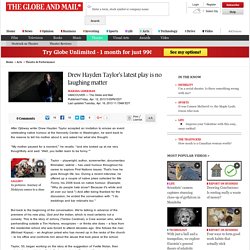
“My mother paused for a moment,” he recalls, “and she looked up at me very thoughtfully and said: ‘Well, you better learn to be funny.’” White people, here’s your one-time Canada Day special: Native people apologize back! Drew Hayden Taylor on Using Humor against Racism. Russell Peters is inspired by his family's experiences and doesn't shy away from racial humour : Profile.
There's this Anglo-Indian guy, going on about Indians trying to bargain with Chinese shopkeepers in Toronto, and defying his father as a child on the advice of a white friend-with disastrous results: "Somebody gonna get a-hurt real bad".

The guy's on stage, in front of a sold-out crowd in New York, London, Sydney, take your pick. Here's the funny thing: Him. Delivering the punch lines is that guy's job, one he does so well that he's among the world's top ranked comedians today. That's Russell Peters, 43, born in Toronto to Anglo-Indian parents who moved to Canada from India, and the first performer of Indian heritage to make it big in the world of comedy. CHIEFS OF ONTARIO SUPPORT LANDMARK CANADIAN 60s SCOOP LAWSUIT AGAINST THE FEDERAL GOVERNMENT CALLING IT GENOCIDE. For Immediate Release Thunder Bay, ON (December 3, 2013) —Ontario Regional Chief Stan Beardy is calling the lawsuit against the federal government an opportunity for justice and healing for the thousands of Indigenous children who were apprehended by the government and placed with non-Indigenous families by child welfare services over three decades.
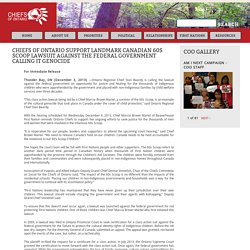
“This class action lawsuit being led by a Chief Marcia Brown Martel, a survivor of the 60s Scoop, is an example of the cultural genocide that took place in Canada under the cover of child protection,” said Ontario Regional Chief Stan Beardy. With the hearing scheduled for Wednesday December 4, 2013, Chief Marcia Brown Martel of Beaverhouse First Nation reminds Ontario Chiefs to support her ongoing efforts to seek justice for the thousands of men and women that were involved in the infamous 60s Scoop. “It is imperative for our people, leaders and supporters to attend the upcoming court hearing,” said Chief Brown Martel. 10 HaydenTaylor. Aboriginals adopted into white families want formal apology. Some aboriginal people who were adopted into white families during the so-called Sixties Scoop say it’s their turn for reconciliation and are calling for a formal apology from the federal government.

Dozens of adoptees gathered in Winnipeg on Monday to tell their stories – many for the first time – and figure out how to get justice. Coleen Rajotte was taken from her Cree community in Saskatchewan when she was three months old and raised by a Manitoba family. The battle over native adoption. Tuesday, February 23, 1999MARGARET PHILPThe Globe and Mail Duncan says he has no regrets about adopting his native daughter, Melissa, but raising her was sheer torture.
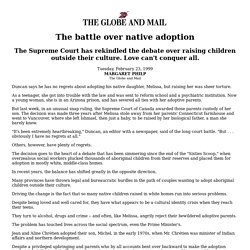
As a teenager, she got into trouble with the law and was sent to reform school and a psychiatric institution. Now a young woman, she is in an Arizona prison, and has severed all ties with her adoptive parents. But last week, in an unusual snap ruling, the Supreme Court of Canada awarded those parents custody of her son. The decision was made three years after Melissa stole away from her parents' Connecticut farmhouse and went to Vancouver, where she left Ishmael, then just a baby, to be raised by her biological father, a man she barely knew. The Sixties Scoop: How Canada’s “Best Intentions” Proved Catastrophic. By Lloyd Dolha In his seminal work, Native Children and the Child Welfare System, researcher Patrick Johnston coined the term “Sixties Scoop” to describe an alarming national phenomenon in which Status Indian children were taken from their homes and communities by provincial child welfare authorities to be placed in non-aboriginal foster homes for adoption.
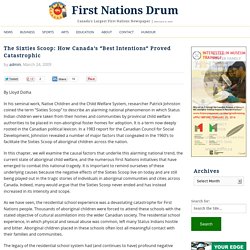
It is a term now deeply rooted in the Canadian political lexicon. In a 1983 report for the Canadian Council for Social Development, Johnston revealed a number of major factors that congealed in the 1960’s to facilitate the Sixties Scoop of aboriginal children across the nation. In this chapter, we will examine the causal factors that underlie this alarming national trend, the current state of aboriginal child welfare, and the numerous First Nations initiatives that have emerged to combat this national tragedy.
Sixties Scoop survivors to gather. P.E.I. aboriginal families still affected by '60s Scoop - Prince Edward Island. An estimated 20,000 native children were removed from their homes during the '60s Scoop, says Marilyn LeFrank, director of child and family Services for the Mi'kmaq Confederacy of P.E.I.
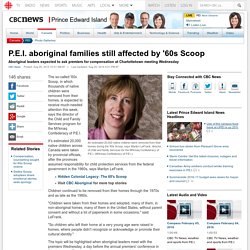
(Mi'kmaq Confederacy of P.E.I.) The so-called '60s Scoop, in which thousands of native children were removed from their homes, is expected to receive much-needed attention this week, says the director of the Child and Family Services program for the Mi'kmaq Confederacy of P.E.I. It's estimated 20,000 native children across Canada were taken by provincial officials, after the provinces assumed responsibility for child protection services from the federal government in the 1960s, says Marilyn LeFrank.
The Stolen Generation(s). If you’ve ever heard the term “60s scoop” and thought it had something to do with ice-cream in the old days, I’m here to enlighten you.
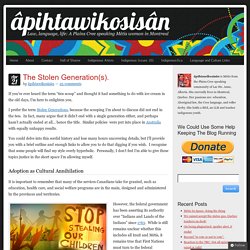
I prefer the term Stolen Generations, because the scooping I’m about to discuss did not end in the 60s. In fact, many argue that it didn’t end with a single generation either, and perhaps hasn’t actually ended at all… hence the title. Similar policies were put into place in Australia with equally unhappy results. You could delve into this sordid history and lose many hours uncovering details, but I’ll provide you with a brief outline and enough links to allow you to do that digging if you wish. The Sixties Scoop: Implications for Social Workers and Social Work Education.
By Emily Alston-O’Connor, BSW Abstract This paper examines issues concerning First Nations peoples and the child welfare system, and their implications for social work today. It explores the Sixties Scoop to illustrate the devastating impact such policies and practices had on Aboriginal children, families and communities. Cultural genocide is part of this legacy. The Sixties Scoop: Implications for Social Workers and Social Work Education Religious leaders and the government of Canada have apologized to First Nations peoples for the abusive experiences they endured in the residential school system.
Stolen Nation 'disappeared' mothers. Stolen Nation Tom Lyons, eye Weekly January 13, 2000 For more than 20 years, Canada took native children from their homes and placed them with white families. Now a lost generation want its history back When former Indian Affairs Minister Jane Stewart made her historic apology to the aboriginal peoples of Canada on Jan. 8, 1998, she singled out native residential schools as the most reprehensible example of Canada’s degrading and paternalistic Indian policies. Designed to assimilate native children into English ways and strip them of their language and culture, the schools also became notorious for sickening physical and sexual abuse.
Commonly referred to as the Sixties Scoop, the practice of removing large numbers of aboriginal children from their families and giving them over to white middle-class parents was discontinued in the mid-’80s, after Ontario chiefs passed resolutions against it and a Manitoba judicial inquiry harshly condemned it. '60s Scoop adoptees find 'some kind of belonging' at national gathering - Aboriginal - CBC. Exposing the truth behind Canada’s hidden tale of shame. Yes, I Use Proper Grammar and No, I'm Not White: The Ugly Truth of "Acting White" in NYC.
This past summer, I had to learn the hard way that racial judgments go far more than just skin deep. ReclaimingOurIdentity Paper. Identity Issues. How Stereotypes Take Shape. Origins Canada. The 'drunken Indian' stereotype and social healing. Aboriginal adoption a challenge for families. Sinclair pp65. The land of lost children. Sixties Scoop. The Official Website of Amelia Earhart.